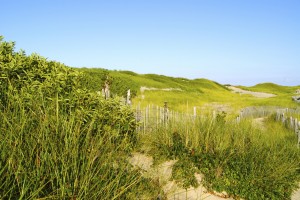Voters in all 15 Cape Cod towns have been remarkably generous in providing protected open space. More than 10,000 acres of land have been set aside from development by purchases by municipalities since the early 1980s. But there is a quieter movement acting parallel and sometimes side-by side with local governments, for more than 50 years now: the non-profit land conservation trusts of Cape Cod, one in each town.
Land trusts are charitable organizations not affiliated with town government. They are run by a board of volunteers elected by dues-paying members of the public. Anyone can join. Many do. All donations of land or cash are tax deductible.
Land trusts work quietly and confidentially with landowners to craft land protection strategies that preserve land and often generate tax benefits, such as savings on income tax, property tax, capital gains and estate tax. They are an important supplement to the work of the town open space committee, community preservation committees and conservation commissions. Sometimes they work closely with the town on acquisitions.
 Collectively, local land trusts have preserved more than 8,000 acres, about the size of five Nickerson State Parks. The first land trusts were founded in Chatham and Falmouth in 1962, the same year that the Cape Cod National Seashore was established.
Collectively, local land trusts have preserved more than 8,000 acres, about the size of five Nickerson State Parks. The first land trusts were founded in Chatham and Falmouth in 1962, the same year that the Cape Cod National Seashore was established.
All of these land trusts belong to The Compact of Cape Cod Conservation Trusts, Inc., which assists them with technical support on their acquisition, management and administrative projects.
Headquartered in Barnstable, but operating throughout the Cape, The Compact also provides legal and scientific research on land protection, and is the repository of wildlife habitat, pond-front, and other resource and land use information used by towns and land trusts.
Entering its 29th year of operation, The Compact, and its member land trusts, ensure that the business of open space might be sometimes quiet, sometimes noisy, but always vibrant.
In future columns, we will examine some of the trends and issues in land conservation on the Cape and in Massachusetts.
Mark H. Robinson is the executive director of The Compact of Cape Cod Conservation Trusts.
























